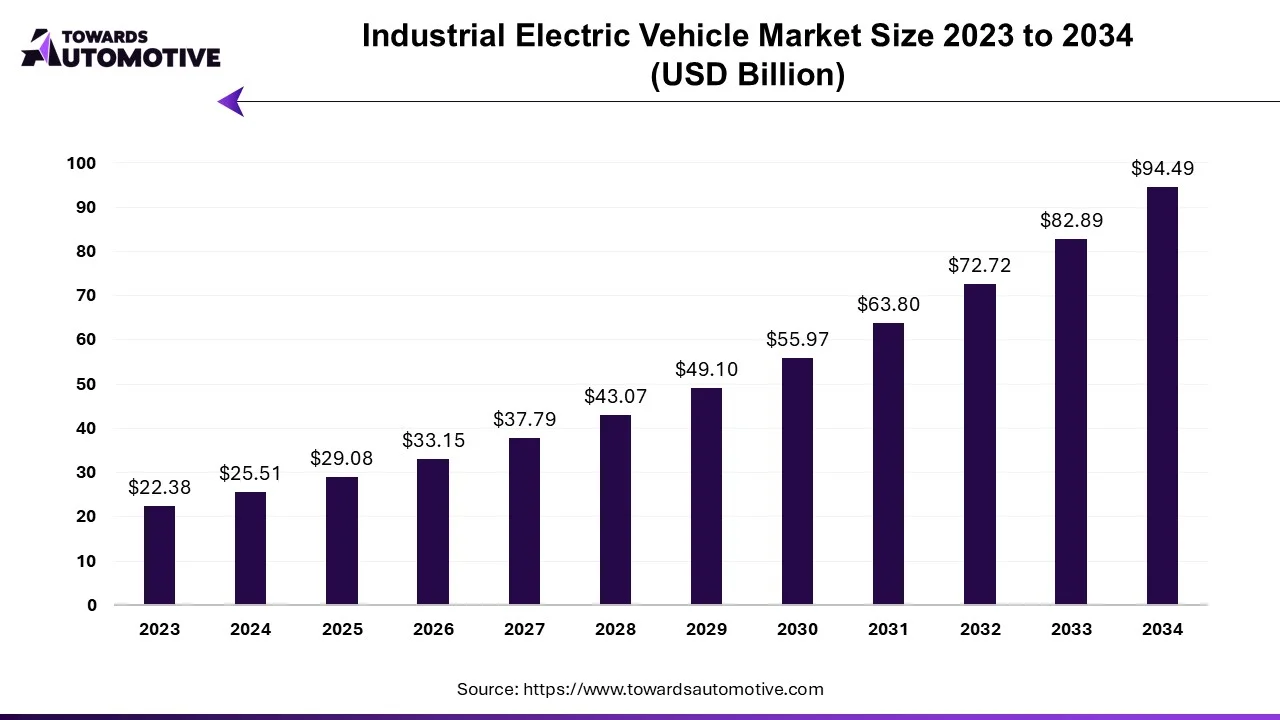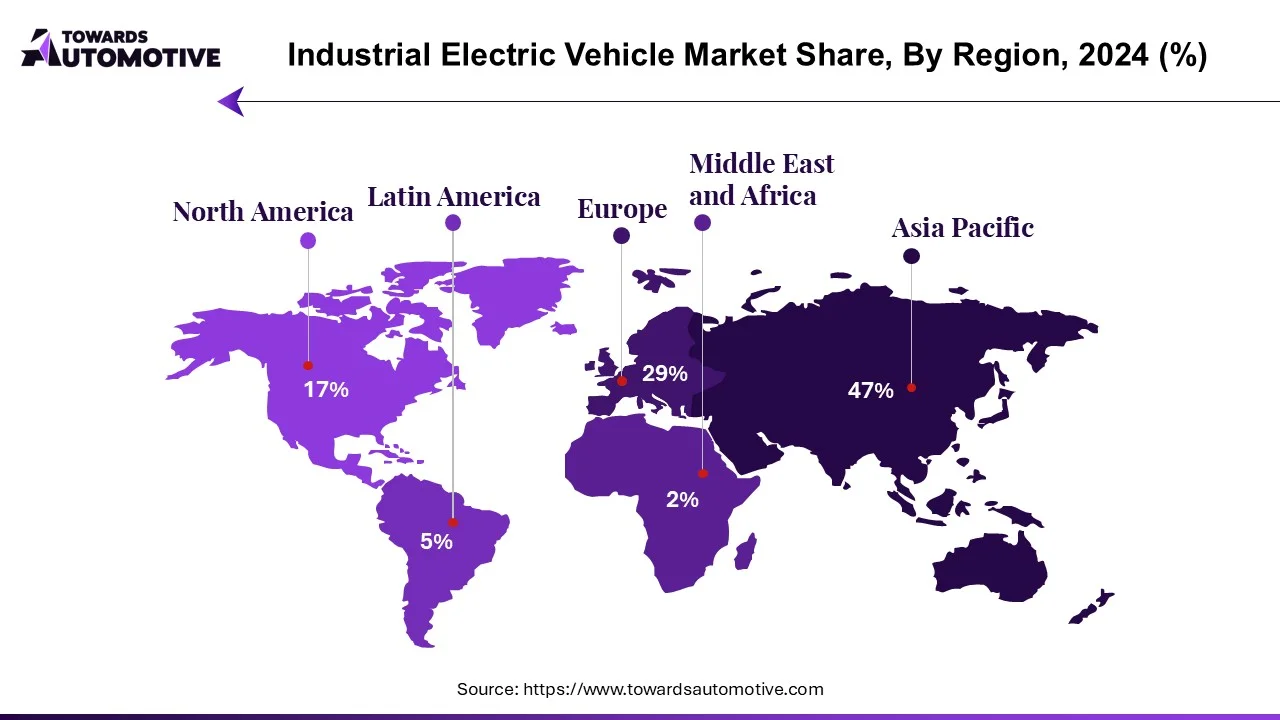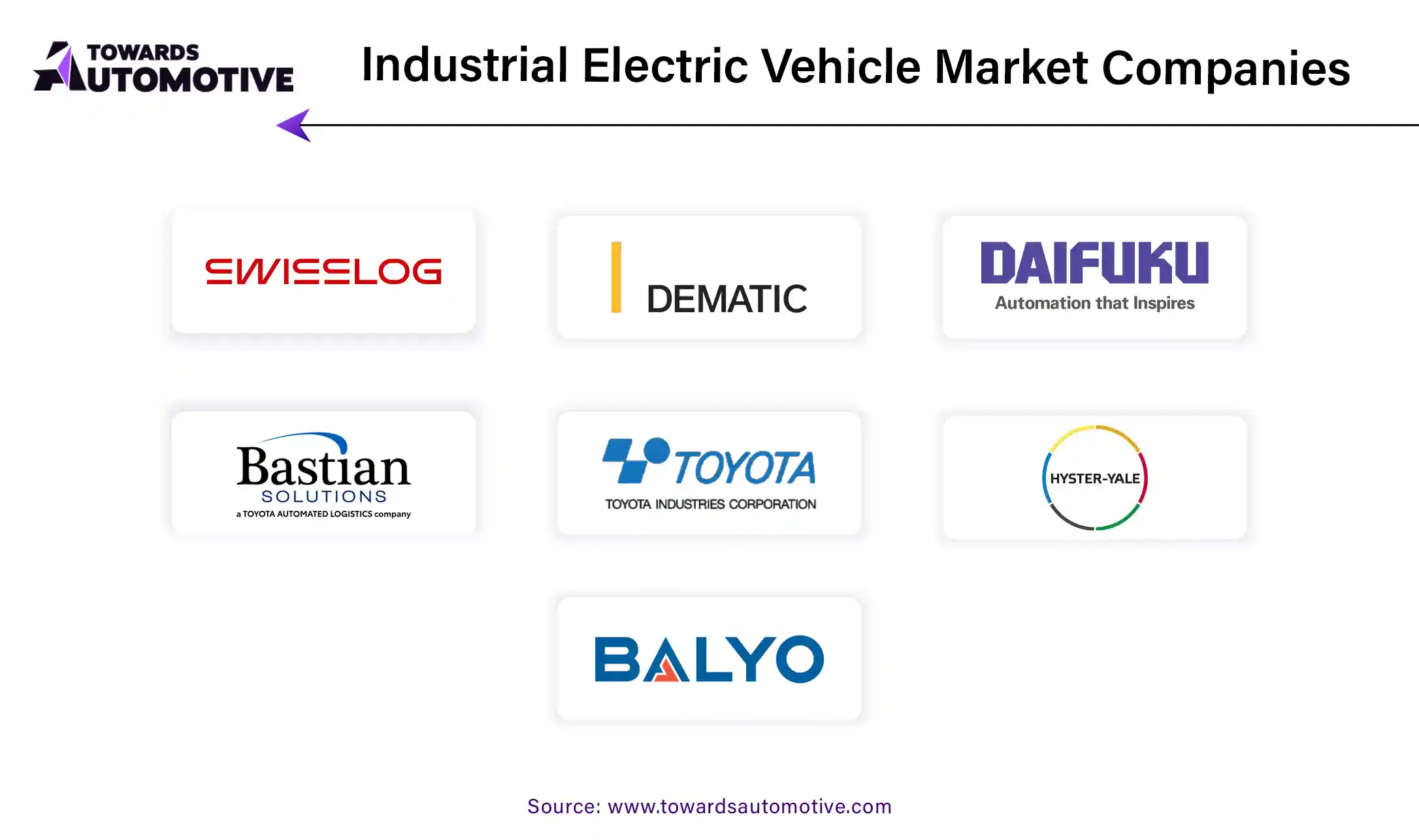Industrial Electric Vehicle Market Size, Share and Key Trends
The industrial electric vehicle market is expected to increase from USD 29.08 billion in 2025 to USD 94.49 billion by 2034, growing at a CAGR of 13.99% throughout the forecast period from 2025 to 2034.

Unlock Infinite Advantages: Subscribe to Annual Membership
The industrial electric vehicle market is experiencing a remarkable surge, driven by the global shift towards sustainable and efficient transportation solutions in industrial settings. With the advent of advanced battery technology, electric propulsion systems, and digitalization, industrial electric vehicles (IEVs) have emerged as key enablers of productivity, safety, and environmental stewardship across diverse sectors.
The industrial electric vehicle market is poised for exponential growth, driven by the convergence of technological innovation, sustainability imperatives, and industrial transformation. As industrial operators embrace electric mobility solutions to enhance productivity, efficiency, and sustainability, stakeholders must collaborate to address challenges, seize opportunities, and accelerate the transition to a cleaner, greener, and more resilient future for industrial transportation.
The industrial electric vehicle market encompasses a wide range of electric-powered vehicles designed for use in industrial environments such as warehouses, manufacturing facilities, ports, airports, and logistics centers. From electric forklifts and pallet trucks to electric tow tractors and utility vehicles, IEVs play a crucial role in material handling, intralogistics, and ground support operations, offering advantages such as zero emissions, reduced noise pollution, and enhanced maneuverability.
Key Components and Functions of Industrial Electric Vehicles
- Electric Propulsion Systems: Industrial electric vehicles are equipped with electric propulsion systems comprising electric motors, power electronics, and high-capacity batteries. These systems provide clean, quiet, and efficient propulsion, enabling IEVs to perform a wide range of tasks with minimal environmental impact and operational costs compared to conventional internal combustion engine vehicles.
- Material Handling Equipment: IEVs include a variety of material handling equipment such as electric forklifts, reach trucks, order pickers, and pallet trucks, tailored to specific industrial applications and operational requirements. These vehicles feature ergonomic designs, intuitive controls, and advanced safety features to optimize efficiency, reliability, and safety in material handling operations.
- Utility Vehicles and Specialized Equipment: Industrial electric vehicles also encompass utility vehicles, tow tractors, and specialized equipment designed for cargo transport, personnel movement, and ground support tasks. These vehicles are versatile, adaptable, and customizable to meet the diverse needs of industrial operators, supporting productivity, flexibility, and operational resilience in dynamic industrial environments.
Key Market Dynamics and Trends
- Rise of Sustainable Logistics: The growing emphasis on sustainability, environmental regulations, and corporate social responsibility is driving the adoption of industrial electric vehicles in logistics and supply chain operations. Companies are transitioning from diesel-powered vehicles to electric alternatives to reduce carbon emissions, noise pollution, and dependency on fossil fuels, aligning with global efforts to combat climate change and promote sustainable development.
- Digitalization and Automation: The integration of digitalization, automation, and connectivity technologies is transforming the industrial electric vehicle market, enabling real-time monitoring, predictive maintenance, and autonomous operation of IEVs. Smart sensors, IoT devices, and telematics platforms provide actionable insights into vehicle performance, energy consumption, and operational efficiency, empowering industrial operators to optimize fleet management and streamline logistics workflows.
- Battery Technology Advancements: Technological advancements in battery chemistry, energy density, and charging infrastructure are driving innovation in the industrial electric vehicle market. Lithium-ion batteries, fast charging solutions, and opportunity charging systems enable IEVs to operate longer, recharge faster, and adapt to demanding industrial schedules, enhancing uptime, productivity, and cost-effectiveness in material handling and logistics operations.
- Modular and Scalable Platforms: Manufacturers are increasingly offering modular and scalable platforms for industrial electric vehicles, enabling customization, flexibility, and future-proofing for diverse applications and industries. Standardized components, interchangeable attachments, and plug-and-play interfaces facilitate seamless integration, upgrades, and maintenance of IEVs, reducing total cost of ownership and enhancing operational agility in dynamic industrial environments.
Global Trends and Market Outlook

- Asia-Pacific's Manufacturing Dominance: Asia-Pacific leads the industrial electric vehicle market, driven by the region's manufacturing prowess, industrial automation, and government initiatives to promote clean transportation. Countries such as China, Japan, and South Korea are investing in electric vehicle manufacturing, infrastructure development, and research and development, positioning themselves as key players in the global IEV market.
- Europe's Focus on Sustainable Logistics: Europe is embracing industrial electric vehicles as part of its efforts to create sustainable and efficient logistics ecosystems. Initiatives such as the European Green Deal, Zero-Emission Vehicle Mandates, and Urban Mobility Plans are driving investments in electric material handling equipment, last-mile delivery vehicles, and cargo handling solutions, fostering innovation and collaboration across the IEV value chain.
- North America's Adoption in Warehousing and Distribution: North America is witnessing increased adoption of industrial electric vehicles in warehousing, distribution, and e-commerce fulfillment centers. Companies are investing in electric forklifts, order pickers, and automated guided vehicles (AGVs) to improve operational efficiency, reduce operating costs, and enhance workplace safety, leveraging advanced technologies and industry best practices to optimize logistics operations.
Challenges and Opportunities
- Infrastructure Development: The widespread adoption of industrial electric vehicles hinges on the availability of robust charging infrastructure, battery swapping stations, and smart energy management systems. Collaborative efforts between governments, utilities, and private sector stakeholders are needed to invest in charging infrastructure, standardize charging protocols, and overcome range anxiety and charging downtime challenges in industrial environments.
- Workforce Training and Education: The transition to industrial electric vehicles requires workforce training, education, and skills development to ensure safe, efficient, and effective operation and maintenance of IEVs. Training programs, certification courses, and hands-on learning experiences are essential to familiarize operators, technicians, and managers with electric vehicle technology, best practices, and safety protocols, fostering a culture of continuous improvement and innovation in industrial settings.
- Regulatory Compliance and Incentives: Regulatory frameworks governing industrial electric vehicles, emissions standards, and workplace safety regulations vary across regions and jurisdictions, posing challenges for market adoption and scalability. Governments can incentivize the adoption of IEVs through tax credits, grants, and subsidies, while establishing clear guidelines, standards, and performance benchmarks to promote market growth, innovation, and sustainability in industrial transportation.
- Data Security and Privacy: The integration of digitalization and connectivity features in industrial electric vehicles raises concerns about data security, privacy, and cybersecurity risks. Manufacturers, fleet operators, and technology providers must implement robust cybersecurity measures, encryption protocols, and data governance frameworks to protect sensitive information, prevent unauthorized access, and ensure the integrity and confidentiality of vehicle data, maintaining trust and confidence in IEV solutions.

Industrial Electric Vehicle Market Companies
- Swisslog Holding AG
- Dematic
- Daifuku Co., Ltd.
- Bastian Solutions, Inc.
- Toyota Industries Corporation
- Hyster-Yale Materials Handling, Inc.
- Balyo
- John Bean Technologies Corporation (JBT)
- Seegrid Corporation
- Kuka AG
- Jungheinrich AG
- Schaefer Holding International GmbH
Market Segmentation
By Vehicle Type
- Tow Tractors
- Forklifts
- Container Handlers
- Aisle Trucks
- Others
By Propulsion Type
- Battery Electric Vehicles (BEVs)
- Hybrid Electric Vehicles (HEVs)
By Application
- Manufacturing
- Warehousing
- Freight & Logistics
- Others
By Region
- North America
- Europe
- Germany
- United Kingdom
- France
- Asia-Pacific
- Latin America
- Middle East and Africa
Recent Developments in the Industrial Electric Vehicle Market
- In December 2023, Tesla, Inc. announced its entry into the industrial electric vehicle market with the unveiling of the Tesla Cybertruck-based electric utility truck. The Tesla electric utility truck offers a robust design, high towing capacity, and long-range electric drivetrain, catering to the growing demand for emission-free and high-performance vehicles in industrial applications such as construction, logistics, and utility services.
- In November 2023, BYD Company Ltd introduced its latest electric forklift models, leveraging its advanced battery technology and electric propulsion systems. These electric forklifts offer quiet operation, zero emissions, and lower total cost of ownership compared to traditional internal combustion engine counterparts, addressing the increasing need for sustainable and efficient material handling solutions in warehouses, distribution centers, and manufacturing facilities.
- In October 2023, Caterpillar Inc. announced the expansion of its electric vehicle portfolio with the introduction of the Cat EP50CN electric pneumatic tire forklift. The Cat EP50CN features fast charging capabilities, enhanced operator comfort, and advanced telematics integration for real-time monitoring and fleet management, meeting the evolving needs of customers for electrified material handling equipment in various industrial sectors.
- In September 2023, Toyota Industries Corporation unveiled its latest electric tow tractor models, designed for use in airports, logistics centers, and manufacturing plants. The Toyota electric tow tractors offer high towing capacity, quick battery swapping capabilities, and ergonomic design features, improving productivity and reducing carbon footprint in intralogistics operations.
- In August 2023, Hyster-Yale Materials Handling, Inc. introduced its next-generation electric lift truck series, featuring advanced AC motor technology and regenerative braking systems. These electric lift trucks offer improved energy efficiency, reduced maintenance requirements, and customizable performance settings, addressing the increasing demand for electric-powered material handling equipment in indoor and outdoor industrial environments.


